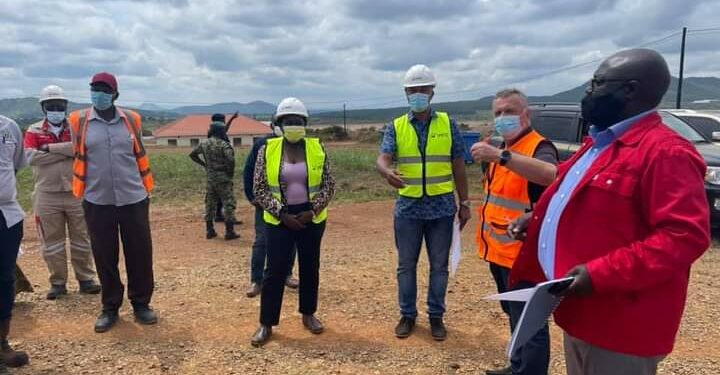Located about an hour away from Hoima town, is the site of the Kabaale International Airport under construction. The 3.5km runway is already in place. From the verandah of the construction site office, I could see a pickup truck that seems to enjoy the runway before planes arrive. It is a beautiful countryside surrounded by a lush green environment of hills. Where the runway is, we are told, that it was hilly but they had to be flattened so that even the world’s biggest aircraft can land and take off.
The road from Hoima to the airport is all tarmac. Apart from a few small trading centres here and there with untethered goats threatening to cross the road at breathtaking speeds, the area is full of natural green vegetation.
The Kabaale International Airport is largely meant to be a cargo outpost feeding the oil and gas industry in the Albertine graben. In fact, this airport is part of the Kabaale Industrial Park, which is supposed to house the oil refinery. But also, it is nearer to both Murchison and Queen Elizabeth national parks than Entebbe, the country’s only functional international airport. It will save tourists and business executives the trauma of driving all the way from Entebbe.
When the oil starts flowing and being pumped to Tanga in Tanzania so it could be shipped to the world and maybe some sent to the refinery, there might not be very many oil and gas jobs for the locals. So how can the locals in Hoima, Buliisa and all the surrounding areas benefit from the infrastructure being built in the area especially the international airport?
The easier jobs that Uganda could create for the majority of people in these areas are in agriculture and food processing. Some leaders claimed in one of the meetings attended by energy ministers who were in the region that Hoima suffers from severe droughts, which could be true even though the vegetation is all green. There are many rivers in the area from which water could be extended to communities for irrigation purposes.
There is also a National Agricultural Research Organization (NARO) regional centre in Hoima, which I believe can easily come up with draught resistant crop varieties. These varieties could then be promoted in the area with an eye on the international market. There is high demand for organic foods in the world and many I believe can be grown in this part of the world.
With the international airport, it means that they can easily be flown to all parts of the world easily and cheaply too. Instead of packing fresh produce in refrigerated containers and driving it to Entebbe for hours, they can simply be flown to London, Dubai or wherever they are needed.
The farmers and indeed the general public won’t do this on their own. They need to be organized into groups, trained in better agronomical practices and supported with start up capital to grow the products that NARO may have identified.
Many people given Uganda’s increasing population don’t have big chunks of land and I am told many of Kampala’s dealers and land grabbers are already in the area doing what they do best. So the best bet is to enable people practice agriculture on smaller pieces of land. An acre of land is sufficient to produce enough food for the household and for export. So if many farmers in the area are organized that way, by the time airport construction is done, they will already be harvesting. This is important because usually not all farmers will want to start as they will prefer to wait and see before they get involved.
The money that has been pumped into the parish model can be used to ensure that farmers have extension services to grow the crops that may have been selected by the NARO team at the regional centre. The National Agricultural Advisory Services (NAADS) can procure the seeds and other inputs for these farmers.
However, for this to succeed, there is need to carryout sensitization and stakeholder engagement of the communities and their political leaders. Many people have focused on oil and gas yet I don’t believe, many people will get direct jobs from the sector. Besides many of the jobs are highly specialized which skills the locals lack. Agriculture is the easiest way for the locals to benefit from oil and gas.
The writer is a communication and visibility consultant. djjuuko@gmail.com
Do you have a story in your community or an opinion to share with us: Email us at editorial@watchdoguganda.com













